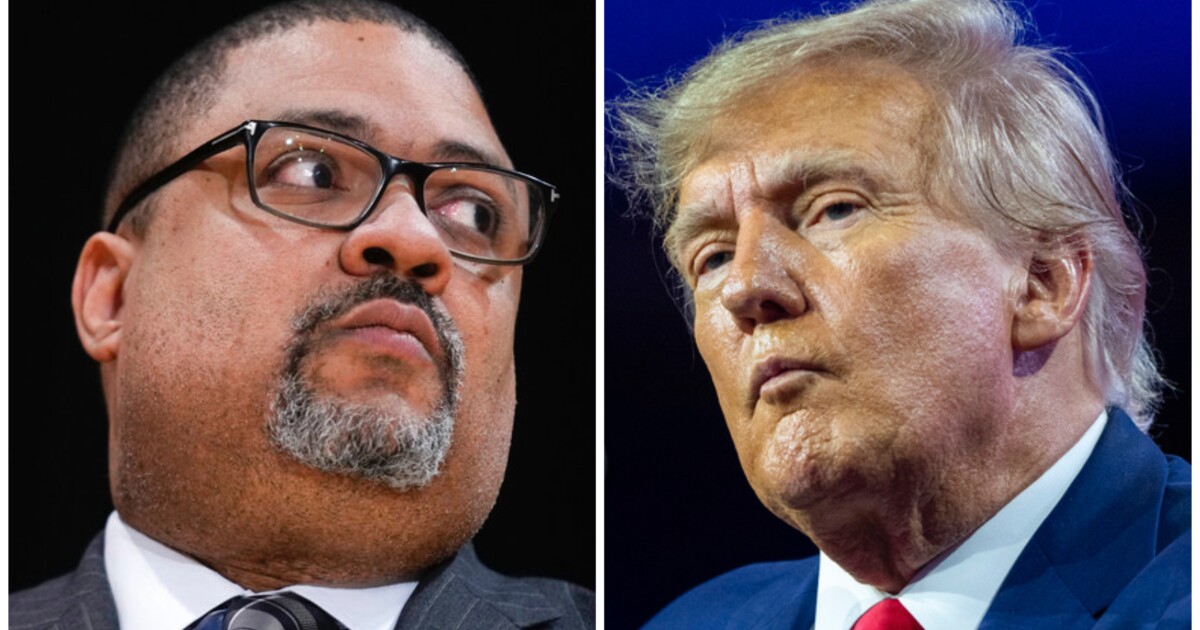

The federal judge overseeing a court battle between former President Donald Trump and Manhattan District Attorney Alvin Bragg cast doubt on Trump’s efforts to move the criminal case’s venue from the state level up to the federal courts.
In an unprecedented indictment, Bragg brought criminal charges against Trump in April on falsifying business records relating to a $130,000 hush money payment made by then-Trump lawyer Michael Cohen to porn star Stormy Daniels during the final days of the 2016 election.
BIDEN TRIES TO SHAKE LOW MARKS WITH ‘BIDENOMICS’ PUSH
The former president argued the charges could not be filed in Manhattan because they related to his role as president. Bragg’s office wants the case to stay in state court, arguing the 2017 payments at issue were regarding his personal affairs before the presidency.
Judge Alvin Hellerstein of the Southern District of New York, nominated by President Bill Clinton in 1998, signaled the case likely belongs in state court — against Trump’s wishes.
“The argument is very clear that the act for which the president has been indicted does not relate to anything under color of his office,” Hellerstein said Tuesday afternoon at a court hearing.
A final decision in writing is expected within two weeks.
Trump lawyers Todd Blanche and Susan Necheles argued Tuesday that the Bragg case should be moved to a federal venue, while Matthew Colangelo, a lawyer for Bragg’s New York County District Attorney’s Office, opposed them.
Trump and his legal team traveled to New York City in early April for his arraignment on 34 felony charges of falsifying business records. He pleaded not guilty, denied any wrongdoing, and decried Bragg’s prosecution as a political witch hunt.
Trump’s team said in court filings in May that “the case involves important federal questions since the indictment charges President Trump for conduct committed while he was president of the United States.”
Bragg has argued the federal court “need not and should not wade into this morass” and should send the case back to the state level “based on the defendant’s failure to identify an act under color of office or any colorable federal defense.”
Bragg’s predecessor, Cyrus Vance, had worked on the investigation without ever bringing charges. Federal investigators, too, had examined the circumstances around Trump’s 2016 payment to Daniels, who alleged an affair with Trump, and decided against pursuing an indictment. Trump denies the affair.
Mark Pomerantz, who resigned from the prosecutor’s office in February 2022 after Vance didn’t pursue the charges that were then finally filed earlier this year by Bragg, declined to answer any questions about the Trump investigation from House Judiciary Committee Republicans in May.
Trump’s lawyers argued in June that “the facts and the law all point to” the Southern District of New York federal court “being the appropriate jurisdiction for this case, one which was brought solely due to the political motivation of the Manhattan District Attorney.”
Trump’s attorneys told the court that “a criminal case is removable to federal court where (1) a federal officer (2) is charged for conduct for or relating to any act under color of federal office arising under color of his office and (3) identifies a colorable federal defense” and that Trump “has more than adequately shown all three.”
Bragg’s office argued in June that “Trump concedes that the 2017 payments at issue in this criminal proceeding were to his personal attorney handling his personal affairs” and so were “separate and apart from the Office of the Presidency.” Bragg contended that “that concession defeats any claim that the conduct charged in the indictment” was “for or relating to any act under color of office.”
CLICK HERE TO READ MORE FROM THE WASHINGTON EXAMINER
In another courtroom Tuesday in Florida, Trump body man and co-defendant Walt Nauta delayed entering a plea again on Tuesday, two weeks after the former president pleaded not guilty following special counsel Jack Smith’s separate classified documents indictment earlier this month.
Nauta did not enter a plea when he appeared at the Miami court with Trump in mid-June, receiving a two-week extension as he sought a local attorney in Florida. Nauta’s lawyer Stanley Woodward contended on Tuesday that he still had not obtained counsel in Florida, and his arraignment was delayed once more to July 6.





